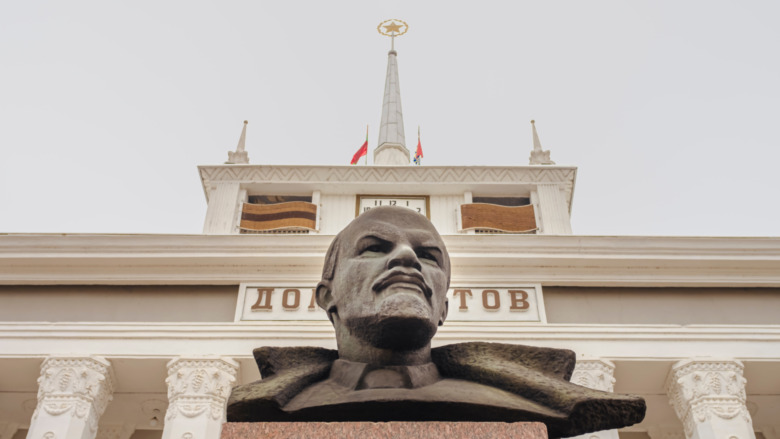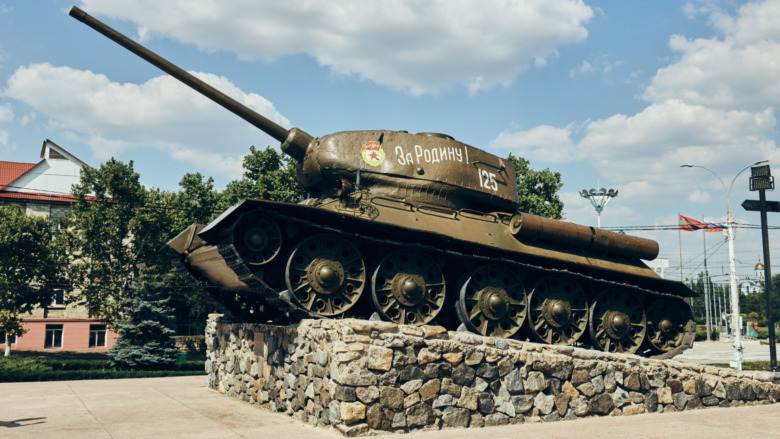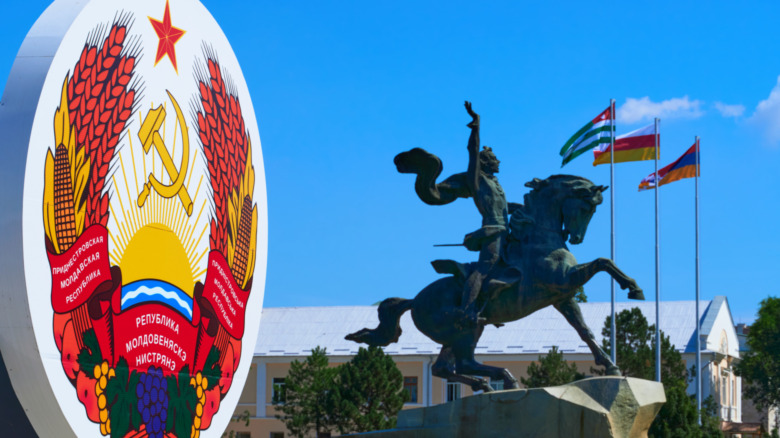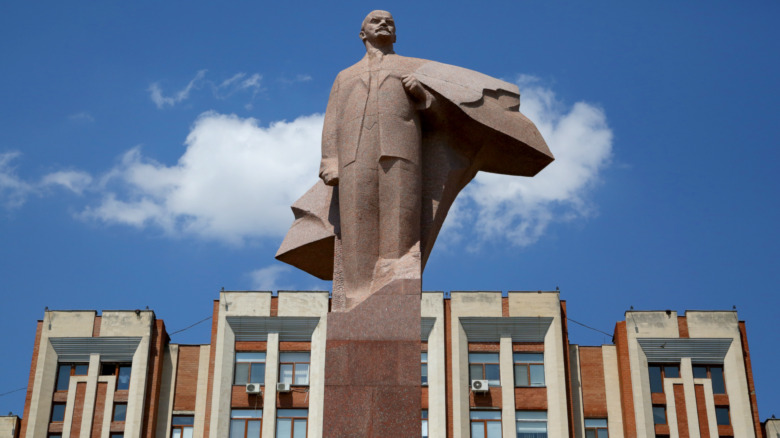Transnistria: The Country You Can Visit That Doesn't Exist
Despite living in an always-on, internet-interconnected globe, some nations, regions, and islands are pretty difficult to get to, and oftentimes it boils down to politics more than infrastructure.
Take Bhutan, the world's only carbon-negative nation, couched at the intersection of China, India, Nepal (with its unusual flag), and Bangladesh. Bhutan is fiercely protective of its national identity and ancient, cliffside Buddhist monasteries, per National Geographic. Or consider Turkmenistan, which after being released from Soviet rule in 1991, as The New Yorker tells us, fell under the reign of Saparmurat Niyazov. Until his death in 2006, Niyazov likened himself to Alexander the Great. He renamed the days of the week according to his own, self-written holy book "Ruhnama," and all but outlawed journalism in his 100% state-controlled, gold-statue-filled nation. Eritrea, west of Yemen, according to Human Rights Watch, has "no legislature, no independent civil society organizations or media outlets, and no independent judiciary," and obtaining access to the country is all but impossible.
And then there are "breakaway" states, countries where life more or less persists the same as anywhere else — go grocery shopping, get mail, do homework — but whose governments haven't been recognized by the rest of the world. Usually, this is due to armed conflicts (for instance, The Islamic State proclaiming ownership over parts of Iran and Syria) or dissolved hegemonies, like the aforementioned Soviet Union, from which countries like Georgia and Moldova sprang in the early 1990s. It's from nations like these that "de facto governments" such as Transnistria emerged.
Broken off from Moldova, which broke off from Soviet-controlled Romania
Really, what's stopping anyone from walking over to a piece of a land, planting a flag and saying, "Mine"? After all, that's practically what all governments did around our current, country-lined globe. And from this subjective definition of place, identity, and creed comes all the sovereignty of legal bodies such as the United Nations. But if the U.N. and other countries don't agree that a country is a country? It might have paved roads, street addresses, and property ownership — even its own currency, suit-wearing government officials, and elections. But it still might not be a "country" as the rest of the world recognizes the term.
Such is the case with Transnistria, also known as Transdniestria and Trans-Dniester (yes, really), but formally the "Pridnestrovian Moldavian Republic," sandwiched between Moldova and Ukraine along the Dniester river. The name reveals everything: They fought against, and declared independence from, Moldova in 1992. They declared themselves a sovereign state, as the BBC explains, and Russia stepped in to stop the fighting before leaving some soldiers behind. The rest of the world considers them a piece of Moldova that runs itself, by itself. Moldova, mind you, broke away from Romania in 1992 after the U.S.S.R. dissolved, after being established in 1924 as the Moldovan Autonomous Soviet Socialist Republic, and then annexed into the U.S.S.R. in 1940, per the BBC. And now? Many in Transnistria want to rejoin Russia anyway.
Book a flight, grab a latte, take a selfie with a tank
Now you can go online and poke around on Trip.com or Expedia and book a flight to Transnistria. Trip Advisor has a Transnistrian "Top Attractions" list that looks precisely like the kind of depressing assemblage of post-Soviet utilitarianism that you'd expect. The overly cheerful folks at Young Pioneer Tours, who specialize in tours to less-widely traveled locations such as North Korea, describe Transnistria as the last country that "didn't get the memo the cold war ended," a place full of "bullet-riddled Lenin statues." Chuckle-worthy as those quips might be, they're accurate. No matter that Transnistria had adopted the veneer of Western democracy and capitalism, like China, and has an elected president, Vadim Krasnoselsky (2016-present). Bear in mind that Transnistria's airport, Chisinau (KIV), is in Moldova.
Dropping down via Google into Transnistria's capital, Tiraspol (the second-largest city in Moldova), reveals a host of coffee shops with latte art that wouldn't look out of place in any hipster neighborhood in the world, except they're next to semi-abandoned Brutalist buildings, along thoroughfares such as "Lenin Street." There are supermarkets, burger places, clinics, car repair shops, colleges, and pizza places next to "Tank Monument" (a Soviet tank on an inclined, stone dais, above), "Monument to Suvorov" (an 18th-century Russian general), and "Monument to Lenin."
CNN journalist Karl Penhaul, as seen in a report on YouTube, had to invent a story about attending a mini-skirt competition to get past Transnistrian border guards and interview some locals.
Human rights abuses and the specter of Soviet dominion
But what is life like for the 500,000 people living in Transnistria? Are they aware that they live in a non-country country? Does it even matter, or affect daily life in the slightest? Or are they like Rip Van Winkle in Washington Irving's classic 1819 tale, who falls asleep under King George, wakes up under President George, and just heads to the local pub as always?
As Deutsche Welle (DW) describes, Transnistria is an "open wound" in Eastern Europe. There are arrests in "broad daylight" for reasons such as "disrespecting Transnistria's 'state order'" (Remember: There is no state), and people are held in jail with no legal recourse. NGO Promo-LEX is investigating death and torture in the Transnistrian army, while individuals such as Maxim, a father, wanted his son Gabriel to "become a real man and thought that Transnistria and the army would toughen him up and turn him into a real man just as the Soviet army had turned him into a real man," per another DW report. Ninety percent of schools are taught in Russian; only eight nationwide answer to the Moldovan Education Ministry and conduct classes in their native Romanian. In turn, students transform into "hostages of the conflict." Yet, no one can intervene — not Moldova, not Russia — because Transnistria isn't legally recognized.
All in all, the specter of Soviet dominion threatens to break apart whatever peace and normalcy can be found.
A degrading breakaway state characterized by poverty and pride
Since Transnistria declared independence 30 years ago, its population has decreased by one-third, reports the BBC, as people have fled to Russia and other countries for better economic prospects. Yet its passports are recognized only by three other, similar breakaway states: Abkhazia and South Ossetia in Georgia (formerly the U.S.S.R.), and Nagorno-Karabakh in Azerbaijan (an area rife with conflict involving, you guessed it, Russia). In Transnistria, you can exchange dollars, pounds, whatever, into Transnistrian rubles, as a forum on Lonely Planet states, but you cannot exchange Transnistrian rubles into other currencies, anywhere — not even in Moldova — and you can't use non-Transnistrian cards at Transnistrian ATMs, as Gov.UK states.
And so, citizens like Feodosia eke out a living selling gas next to abandoned train tracks, as DW states, encased within a limbo "nation." She reminiscences about the good old U.S.S.R. days, before the "anarchy" of the present. This kind of nostalgia by way of Stockholm Syndrome characterizes much of the nation, full of individuals who want to join the Russian Federation but who "feel independent," as public servant Vera Galchenko said during the 2019 military parade celebrating Transnistrian independence.
President Krasnoselsky ran and won using a Russian reunification platform; his party is even called the "Moscow-based United Russia Party," per the BBC. But now? He advocates an "evolutionary" relationship with Russia. In the meantime, Transnistria exists, and doesn't exist, and is full of as much confusion as it is poverty and pride.




